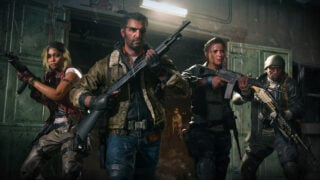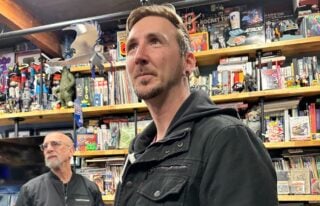Interview: How Treyarch wants Black Ops 6’s new movement system to change the genre
The studio hopes Omnimovement will redefine the FPS, not just Call of Duty

Something feels different about Call of Duty this year.
For the past few years the series has been started to feel a little by-the-numbers. While Warzone has continued to ensure Call of Duty fans are still regularly engaged, even the most hardened devotee would concede that a shake-up is needed with the ‘main’ series.
2021’s Vanguard was met with a mixed reception, and while 2022’s Modern Warfare II fared better it was undone last year by Modern Warfare III, which dropped a nuke on the series’ momentum in the shape of a 56 Metacritic score.
Change has been sorely needed, and with its new Omnimovement mechanic sitting boldly atop its feature list, Black Ops 6 feels like it might be the game to provide it.
Treyarch has been working on Black Ops 6 for four years – longer than it usually gets – and is also using the now-standard ‘unified’ Call of Duty engine for the first time. It’s a move that, according to the studio, has enabled it to deliver a game that brings back some of the features fans have been missing while also, crucially, offering something that feels fresh.
On Monday, the game’s associate design director Matt Scronce and senior director of production Yale Miller spoke to press about the making of Black Ops 6 and their hope that Omnimovement could not just change the way Call of Duty is played, but the first-person shooter genre as a whole.
The questions below were taken from a group of journalists from different media outlets.
A lot of people were wondering where Black Ops 5 went when you announced Black Ops 6. From your perspective, what makes this worthy of being a numbered sequel where Black Ops Cold War wasn’t? Is that indicative of the volume of content or ambition with this one?
Yale Miller – No, I think we’re proud of the game we made with Cold War. I think Cold War really just fit that era, and made sense for that, and with all the different modes and parts of the game that we’re making [this time] I think for us Black Ops 6 works.
In classic Zombies fashion we’ll probably go all over the place, and probably play and go different places.
We talked about doing locations, specific conflicts, things like that, but generally for us – and when I say ‘us’, the development teams, there’s lots of dev studios working on it – if Black Ops 6 is good because it encompasses everything that we’re doing, it allows us kind of freedom to go different places. Who knows where we’ll go in the future with Zombies, lots of different locations, that kind of classic globetrotting.
For us, Cold War was Black Ops 5 and it was never a question that it would be Black Ops 5. For us, Cold War was absolutely a full Call of Duty game, and Black Ops 6 will be the next one.
Cold War was attached to one specific historical event. Is that the case again here? Because it’s the early ‘90s so it appears to be the Gulf War.
YM – For us I don’t think it’s critical that it’s tied to a specific… it’s really the story, right? So a lot of the story of Black Ops Cold War was directly tied to the Cold War and that conflict.
For Black Ops 6, hopefully you saw it’s about variety, and lots of different things. There’s things that are happening on the surface, which we all remember, but it’s a Black Ops story, it’s a fictional story. It’s everything that’s happening underneath.
And so it happens to be that you go to the Gulf War as part of it, but then there’s conflicts on US soil, there’s Avalon, which is a made-up city, there’s lots of different places where you go on this globetrotting story.
Matt Scronce – Black Ops 6, like every other Black Ops game, is purely fictional. But we do set it in the early ‘90s and it does help to have those historical touch points.
But again, in true Black Ops fashion, it’s not what’s happening ‘up here’ – “the stock market’s going crazy and everything’s great” – because we actually know not everything’s great, and it’s about Black Ops and the team, what’s happening underground and behind the scenes, and the stuff that nobody’s really talking about. But as always, it’s purely a fictional story.
There’s a clear throughline with this game and Cold War. Cold War was really well received, especially Raven Software’s campaign. But perhaps some people felt they could have had more in terms of volume. Obviously, it was a pandemic game, so there was a lot going on there, but what expectations should players have in terms of volume this time around compared to Cold War?
YM – The game starts with “what’s the story we want to tell”. From a sheer missions and other things [point of view], I think it’s absolutely in line with a classic Call of Duty. Obviously different players can play it faster or slower, but there’s a ton of depth and kind of other things that you can do and explore in different ways.
“From a sheer missions and other things [point of view], I think it’s absolutely in line with a classic Call of Duty.”
How much time did you spend making this game from beginning to end?
YM – We started working on it, ideation and talking about it, right after Cold War. So from then until now. We still have what feels like a lot of time to go with the six months of push. So we started there. We also had a huge moment for us, which was the move to the unified engine. That’s a big thing for us.
We started off by looking at and dissecting what are all the parts of a great Black Ops game, and what are the things that we think it needs, Conversations about the era we want to go to, and those things.
We really thought the story the team wanted to tell was to go forward with Cold War. So then we looked at, well, if you go forward with Cold War, then you’re in the events of Black Ops 2, which had flashback missions, and so the early ‘90s was a good spot for us to land.
But yeah, since Cold War, we’ve been focused on this.
MS – It is a bit longer than we typically had in the past, so that has given us the opportunity to take a step back and say, “what does it mean to be a Black Ops game?” Especially with the shift to the unified engine across all the studios, us really getting a chance to take a little bit more time to be very intentional about what it means to be a Black Ops game – the campaign, the insane mission variety across the campaign.
Just over time, as we present the game and pitch the game over the course of development, going from “it’s a stealth mission” and it’s just words in a box, to “now it’s a storyboard”, and now to the point where we’re seeing this amazing mission on screen, at the Xbox Showcase. Multiplayer, 16 brand new maps on day one.
It is a little bit longer than we’ve had, but because of that, we’ve been able to be really intentional about: “What do we want, what exactly do we want to be at the moment? How can we push on the fidelity, on the movement?” There are just some of those things that wouldn’t have happened if we didn’t get the opportunity to do that.
So we started after the end of Cold War, we’re in 2024 now, so it’s been four years from conceptual to where we’re at.

One of the most interesting things about Call of Duty is we get to see the presences of these different studios showing in the games. The Modern Warfare 2 reboot was slow and calmed down a bit, then Modern Warfare 3 speeded it back up. It seems like there’s a similar thing going on here with Omnimovement, sprinting in any direction. What do you see as the personal touch from Treyarch and Raven on this one?
YM – The intention was never to speed it up, I think. Matt can speak to this better than I can, frankly, but from the start of development movement was critical for a Black Ops game. When we think about some of the favourite [entries], something that was there was that fluid feel. So that’s where we really started: what could we bring to that, and what rules could we break.
MS – It really did start with fluidity. Again, we had a little bit more time, so looking at from standing still until I’m leaving a match or I’m done with the mission, looking at every single scenario throughout that, what doesn’t feel good, or what doesn’t feel fluid, or where can we push a little bit on fidelity, the death animations? You know, literally every single step of the way in taking those audits.
But to specifically answer your question – one word, fluidity. It never really came down to ‘let’s make something faster or slower’, it was like: ‘What do we want to do for this game? And then how do we get there?’
What can you say about Warzone?
YM – That we’ll have a lot more to talk about on Warzone in the future. (laughs)
MS – I think we can say that the Black Ops 6 content will be in Warzone. So [players will be] carrying forward their Modern Warfare 2, Modern Warfare 3 then Black Ops 6 content.
Touching on the 16 new maps that will be there on day one, do you have some favourite scenarios or some environments that you thought would be great to put in the game, or how did you come up with those 16?
MS – I mean, I have some personal favourites. One that you saw today was named Derelict. It’s a broken down train graveyard set in the Appalachia region. I think it’s maybe visually the best looking map that we’ve ever shipped. The team’s very proud of that. But it also plays really, really well. It’s got a very distinct vibe. Then, you know, hitting the early ‘90s vibe, you’ve got some graffiti and some cool vibes there.
Another favourite of mine, that I think we also saw today, was a map called Scud.
We’ll get into it more throughout the year, but as we touched on in the Black Ops 6 Direct, multiplayer takes place directly after Campaign, so the story unfolds there. So there’s a really interesting narrative layered into the map.
And then in between the maps, you might be playing one map and you’ll see missiles raining down in the vista. In another map you actually may be seeing where those missiles are coming from. So there’s some really cool storytelling.
“You might be playing one map and you’ll see missiles raining down in the vista. In another map you actually may be seeing where those missiles are coming from. So there’s some really cool storytelling.”
The directional movement changes sound like a hugely impactful change to the core design of a Call of Duty game. Has that forced you to rethink certain elements of the game’s design by putting such a substantial change in, and what disruption has that caused, in that some of the classic design elements now might not work the way you intended?
YM – I think there’s lots of little pieces. The Omnimovement really started with Matt prototyping it at his desk. It started with “what if you could sprint in every direction”. The big thing is that in movement, everything is connected.
So I think the big one is – if you’re diving to the side, as an example. The way our old prone system worked, when you went down on the ground, it was always only on your stomach. But if you’re diving to your side, how does that then work? It doesn’t, because you’re on your side, but then how do you get to your stomach?
So there were a lot of things where I guess you could say it snowballed, like “well that doesn’t work anymore” or “that looks broken” because all of our transition animations were assuming you were only going to be able to get down to the ground forwards, but now you could get down to the ground diving backwards or sideways.
So I think the big one is the ability for us to start a new chain of movement and then see where it goes, and actually address all of the different points. And then you need to be able to figure out how you then get back up – from, like, if you were on the ground on your back, to get back up to be sprinting sideways versus the others.
So there’s a lot of snowballs, I guess, that required us to address things.
MS – Yeah, there’s definitely been some rethinking, like the example Yale gave of diving on your side, which was just not possible before Black Ops 6.
But even, say, a prone scenario, where we may have a conversation and say “hey, you know that movie scene where the guy is rolling around on his back and rolls to the side and shoots under a truck, and then turns around the shoots the enemy coming through the window?”
From a level design perspective, in the past, we may have blocked underneath that truck so you’re not shooting feet, but we want to support that scenario in a Campaign level. So there’s things we’ve had to rethink on a level design side [too].
On a combat side, if I could only sprint forward, then I didn’t have to think about what my time to combat is, or when I can shoot my weapon from a sprint in any direction but forwards. So now we have to think about what’s my sprint-out time left, right, backwards.
We’ve read white papers from the Air Force Academy on what is the actual speed that a human being can physically sprint backwards.
“We’ve read white papers from the Air Force Academy on what is the actual speed that a human being can physically sprint backwards.”
YM – Yeah, as a percentage against their forward-locomotion speed to make sure that it actually fits and makes sense, because there’s that ‘breaking reality’ stuff.
MS – On that note, we’re Black Ops, right? We’re going to push the envelope a little bit, but with Black Ops 6, we’re still grounded in reality. So it is about that action hero thriller. You could dive forward through a window in real life and roll around and land on your back. You’re going to be bruised a little bit.
YM – You might not get up as quickly as you do in the video game.
So is that going into multiplayer as well, or just the Campaign?
MS – It’s global. Campaign, Multiplayer, Zombies.
So have you then had to think about aim assist and things like that?
MS – Yeah, we’ve looked at aim assist. Like I said, there’s not a single point of the combat loop that we haven’t taken a hard look at, whether it’s Omnimovement or the brand new death animations, which are also global.
It all comes back to keeping players in that flow state, and then when you break that down it’s fluidity and fidelity, and anything that doesn’t make sense in your brain calls you out of that flow state.
So literally every part of the combat loop and visual fidelity has been looked at, and we’re just trying to keep players in that flow state.

Some studio-specific touches have become standard in future games, like reloading while aiming down sights in the 2019 Modern Warfare. Do you see Omnimovement as something you want to catch on and become a standard in the series?
YM – I think time will tell. We think of it that way – if it’s great, people are going to want it. We’ve done lots of systems and worked on lots of things – I guess Prestige is an example. Something that existed in the past, that even if you try other things, it doesn’t mean it’s still not what you should go back to.
So when we’re thinking about movement, it’s absolutely for us a platform. And I think the interesting thing as well is that we’re not putting some construct on top of it, like “oh, you can now do this thing that normal people can’t do”. It’s more actually making it capable for you as a player to do all the things that actual people can do.
So we hope we do a great job at it and that, frankly, everyone who plays – that’s one of the exciting things for us, the beta’s coming soon, it’s only a few months away so we can get more people to play. We’re not done. We’re going to continue to tweak as we get different skill levels, really good players. People who’ll find ways to exploit it. We want that, so that we can just continue to polish it.
But absolutely, it’s our hope that it becomes a standard. I think if it’s really good, it won’t just become the standard for other Call of Duty games. Hopefully we do something, just like we play other games and go “that’s dope, we want to try that in our game, how can we put our spin on it?” We hope it’s viewed that way as well.
“I think if it’s really good, it won’t just become the standard for other Call of Duty games. Hopefully we do something, just like we play other games and go ‘that’s dope, we want to try that in our game, how can we put our spin on it?’ We hope it’s viewed that way as well.”
Does that become a multi-studio decision when you’re working on something that can be so impactful across titles? If the players like it and it’ll probably be requested in future games, to stop each other treading on your toes do you need to have that conversation with Infinity Ward and Raven and Sledgehammer and say “hey, we’re working on this, what do you think?” Because the next Call of Duty game could then come out with a different movement system.
YM – No. We work with a lot of stuff. I think our goal every year – we have partnerships across the other studios, and sometimes there’s experts who give opinions and help out, like engineers, animators and others that are helping out.
Frankly, there’s been people from Infinity Ward, Beenox and other studios who have helped out on this stuff, and experts on these things to get other points of view, and also just to help.
Did you work with consultants during development?
YM – With movement, specifically?
With everything.
YM – We definitely get outside opinions from players and different groups and we do research, we do focus groups, all different kinds of things like that.
MS – Speaking specifically about movement, I spent a bit of time at motion capture studios with some really, really talented stunt men and women.
I’d go, “I want you to be able to sprint backwards with a big light machine gun”, and they would say “okay, well, here’s how I would do it”, and they did it. So again, making sure it’s all physically possible.
But I think that’s an example of working with a very talented individual who can kind of tell us how we can pull off some of the things we want to do.
YM – And all the co-studios, they all want us to make the best possible game we can. So I think it’s the same thing – by no means does us doing something mean that a future label has to take it. I think if it’s great, we hope they want to. This is really how we think about it – make something awesome.
MS – With Black Ops 6 we say “there’s no going back” a lot, and I think that can apply to a lot of things. I think, for me, I feel that pretty strongly with movement, to a point where I play a lot of games, and when I go play those other games I miss Omnimovement.
There’s just certain things, and it’s not just about being able to pull off the action hero manoeuvres, it really is partially a quality of life improvement, in how you move through a level.
A specific example is if you’re going through a house and there’s that kind of tight staircase where you’ve got to wrap around and wrap around, before Omnimovement, if I turned too sharp I’d stop sprinting and I’d be like “oh, that’s annoying”. That doesn’t happen with Omnimovement, so it’s not just about those bombastic manoeuvres.

Have you had to change level designs to account for not only Omnimovement, but the new ‘Intelligent Movement’ with automatic sliding and mantling? Have you had to rethink map design with these abilities in mind?
MS – I don’t know that we’ve rethought it. We’ve worked closely together on making sure there’s opportunities provided to pull off the sliding through a hole, and leveraging Intelligent Movement settings.
I don’t know that we’ve really had to rethink it, because foundationally, it’s still built off of the familiar mechanics of sprinting, but we’ve definitely worked closely together on making sure that we’re providing those opportunities.
The Campaign this year requires an online connection. Could you tell us what benefits players will see for that? Game size is something that you guys have battled with for several years, is that maybe going to come down as a consequence of this?
YM – The exact specifics on things like texture streaming, I don’t have all the details on. I know we’re continuing to focus on overall file size and other things, even the launcher as well. With Black Ops 6, you’ll see a refresh of that.
So we’re always looking at it from a technical perspective, how can we make it so players are only having to hold the content that they actually want?
So if you’re going to play something, that’s the content you have, and then let’s say you’re a Warzone player, that you’re not ‘paying’ for content twice from a size perspective.
And then, also, approachability is a big thing for us, making it easy for people to access content. We have an opportunity when new players come in, we’ve sat and literally counted clicks into the game and those things – how easy is it to access the game?
But the specifics on streaming and online connectivity for Campaign, I actually don’t have the specifics on that.
Has being on Game Pass impacted on any of this structure?
YM – We haven’t known about Game Pass for that long. It was something that we were questioning whether or not it was going to happen.
From the beginning, with Black Ops 6, we definitely thought about how it’s going to be a long time since players played a Black Ops game.
So whether it’s Zombies – this big epic experience with huge questlines and a great story, there’s a lot of players who just won’t know, will have never played a round-based zombie experience. So how can we teach people that with multiplayer and foundational stuff on movement? There’s a lot to show players, so we’ve been thinking from the beginning about how we bring players in.
Since we found out about Game Pass, we’re re-looking at those things. There’s hopefully going to be more players than ever, at least trying. We think we’ve made a cool game that’s fun to play, that actually has a really big variety of experiences for lots of different players.
“So how can we make it clear to players how to get in, how to experience it, how to find the fun for them and make it clear that “hey, this mode is about this, and this is about this”?
And even in multiplayer we have party modes, and loads of other things that we do, so how can we be clear to players who’ve maybe not played Call of Duty before that “here’s the different offerings, and here’s ways you can access them”.
For the past few years, all the Call of Duty games have ‘plugged in’ together and shared content, there’s been some synergy there. Treyarch always had its own personality (such as with time to kill), so how challenging is it to keep your stamp on your Call of Duty entry these days when it now has to plug into Warzone and the like?
MS – I mean, there’s always challenges. I will say I don’t think it’s been very challenging, bcause we all respect each other and we also realise that we all bring our own flavour to it. I talk regularly with every other studio and the design teams over there, so what they want to do with health values or time to kill doesn’t really affect us on the ground floor.
Especially when we’re talking about Black Ops 6, again, it was all about what we wanted to do to make the best Black Ops game we can. And when it came to health values or time to kill, we honed in on “this is where we want to go and we’re not worried about anything else or what other people are doing”.
If we need to have a conversation then sure, but really, the challenge only comes down to what we want to do.
“It was all about what we wanted to do to make the best Black Ops game we can. And when it came to health values or time to kill, we honed in on ‘this is where we want to go and we’re not worried about anything else or what other people are doing’.”
YM – Even from the beginning, we definitely looked at – we want to make an awesome Black Ops game, but what is a Black Ops game? What are the parts that are really important? Is it the fluidity of movement? Is it the right time to kill? Even stuff like colours and vibrancy, like a slightly more saturated look.
So from the beginning, especially with us moving to the unified engine, we had to choose “bring this, this is the thing we want to do”. We built everything from the ground up versus in the past, where we were often starting from the last game we made, but during that four years we obviously moved to the unified engine.
So we chose specifically the things we want, even stuff like bullet sounds and hit sounds and all these kinds of things from the beginning, we actually like made intentional decisions. “This is the sound we want,” “this is the look we want,” “this is how we want lighting to look.”
And hopefully someone who understands and plays Call of Duty should go “that’s a Black Ops game.” The second you play, very quickly hopefully, as a player, you understand it’s a Black Ops game. That’s our intention.
Can you speak to why the Infinty Ward engine…
YM – The unified engine, it’s just the Call of Duty engine.
The one that started with Modern Warfare 2019. Why was that chosen?
YM – I think we just looked at it, and obviously Infinity Ward had been working off it, Sledgehammer had been working off it as well, and then looking at us on our own, I think it was more about the order of operations of games and looking at how we can build on it.
We felt there was a lot of great things that engine had, but we felt there was also a lot of great stuff that our engine did as well. And so it’s been a big team effort of everyone pushing together.
And the big one is just, instead of us seeing something and going “wow, that’s really cool, how are we going to be able to beat that?” or “that looks awesome, how are we going to do that?” we can stand on each other’s shoulders now and we’re not competing against each other.
Now I’m clapping when they come up with something new in Modern Warfare 2 or 3 because I’m like “wow, we can take that further”. So it’s been exciting for us where we can just hopefully make more game.

Obviously, there was definitely time during those four years when we had to learn. The engine was different. So development was slightly different, the tools are slightly different. There’s a bunch of stuff that we brought over from ours, but there was definitely a learning curve there, and I think we’re really starting to put it through its paces.
We brought a ton of new stuff to it that we can choose and other teams in the future will be able to choose from the things that we brought to it, what do they want to use or what do they not want. And that can be a choice, versus something that’s a function of time.
Because Black Ops 6 has the Campaign, Zombies and Multiplayer, what’s the main throughline between all of this? What is the main thing to focus on?
YM – I think it’s probably two things. It’s all grounded in an era, so that’s one. And then I think the idea of rogue operators – even the gear that you use in the game, a lot of it is DIY. So you have a bunch of gear and tech that isn’t ‘off the shelf’.
So I think those are probably the two biggest, is that you’re not necessarily supported by the large military machine as the hero operators and what that brings. So it’s the era, and the rogue operators, in that you’re not backed by Uncle Sam.
With the return of the traditional Prestige system, are there any other classic COD systems that may have changed a lot over the years but are reverting back?
YM – There’s a bunch of rich progression systems, camo systems and others. Our system designers are awesome and they want to make a bunch of that stuff. So I think there’s a bunch of things that you’ll recognise, but evolutions of things. So you can definitely expect the most rewarding progression systems we’ve had.














